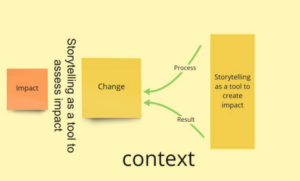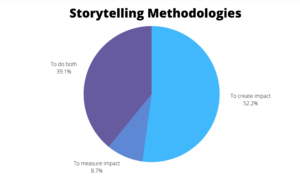The first output of the “Narratives of Impact” project it’s now out!
The Narratives of Impact (NOI) project aims to create a shift in the perception about storytelling, not only as a powerful tool for creating social change but also for measuring the impact and the change.
We want to understand how people can use digital stories to create impact at local, national and pan-European levels, and also how activist groups use stories to create communities of change. That is why we have created the first output of the project and we have explored how lived experience can be used to create better connections between social services and their users.
In the past months, together with our partners, we have conducted a desk-based research analysis about the current state of play of storytelling methodologies across the participating countries and the European landscape.
Each partner had to collect information about at least four different storytelling methodologies so that we had a clear representation of the scenario.
From this research, we have created the “Using Digital Storytelling for Impact and Change Measurement” report, which is available at this link

In this report, you will find a series of methodologies and case study examples for using storytelling as a tool for social change and measuring the impact of civic society work.
The report opens with a brief introduction on the project, what is “storytelling of lived experiences” and what is the “impact” definition of the project.
The 23 storytelling methodologies analyzed are divided into three categories:
- to create impact;
- to measure impact;
- to both create and measure impact;
We divided the storytelling methodologies into these three categories depending on the information we collected during our research.
Thanks to the analysis of these storytelling methodologies illustrated, we can now summarize the most important findings of the research:
• The storytelling methodologies illustrated are divided into: 52.2% to create impact; 39.1% both to create and to measure impact; 8.7% only to measure the impact
• A few of the methodologies are dedicated to climate change and sex education, while a higher number of methodologies are focused on health and wellbeing and civic engagement
• The most frequent targets are students, local communities, and people with mental illnesses. A few methodologies involve also children, people with disabilities, people recovering from addictions and people in the arts.
• Among the activities conducted by the methodologies, group sharing and discussion are widely used, as are video recordings. Instead, games and podcasts are used infrequently.

From the results we collected, it is clear that most organizations use storytelling to create impact, at least with a clear structure and intention. Measuring impact is often secondary to creating it (because seen as a “soft” output). Probably, people don’t know how to analyse stories of lived experience.
We believe that more people use lived experience storytelling to measure impact; perhaps, they just don’t realize it because there is not a formal process to do it. The act of someone telling their story to demonstrate the impact that they have seen, felt, or experienced is an act of measuring impact itself. It just needs to be harnessed by those who need to make those measurements tangible.
These findings give the Narratives of Impact project a clear direction for further months. The remaining intellectual outputs of NOI are a toolkit for using lived experience storytelling to measure impact and a library of video resources. Our aim is that these new outputs will enable individuals and organisations to measure the impact of their work, policies, social change etc. using lived experience storytelling. We will be embedding our learnings from this piece of research into those intellectual outputs so that they meet the stakeholders’ needs.
Stay tuned!
